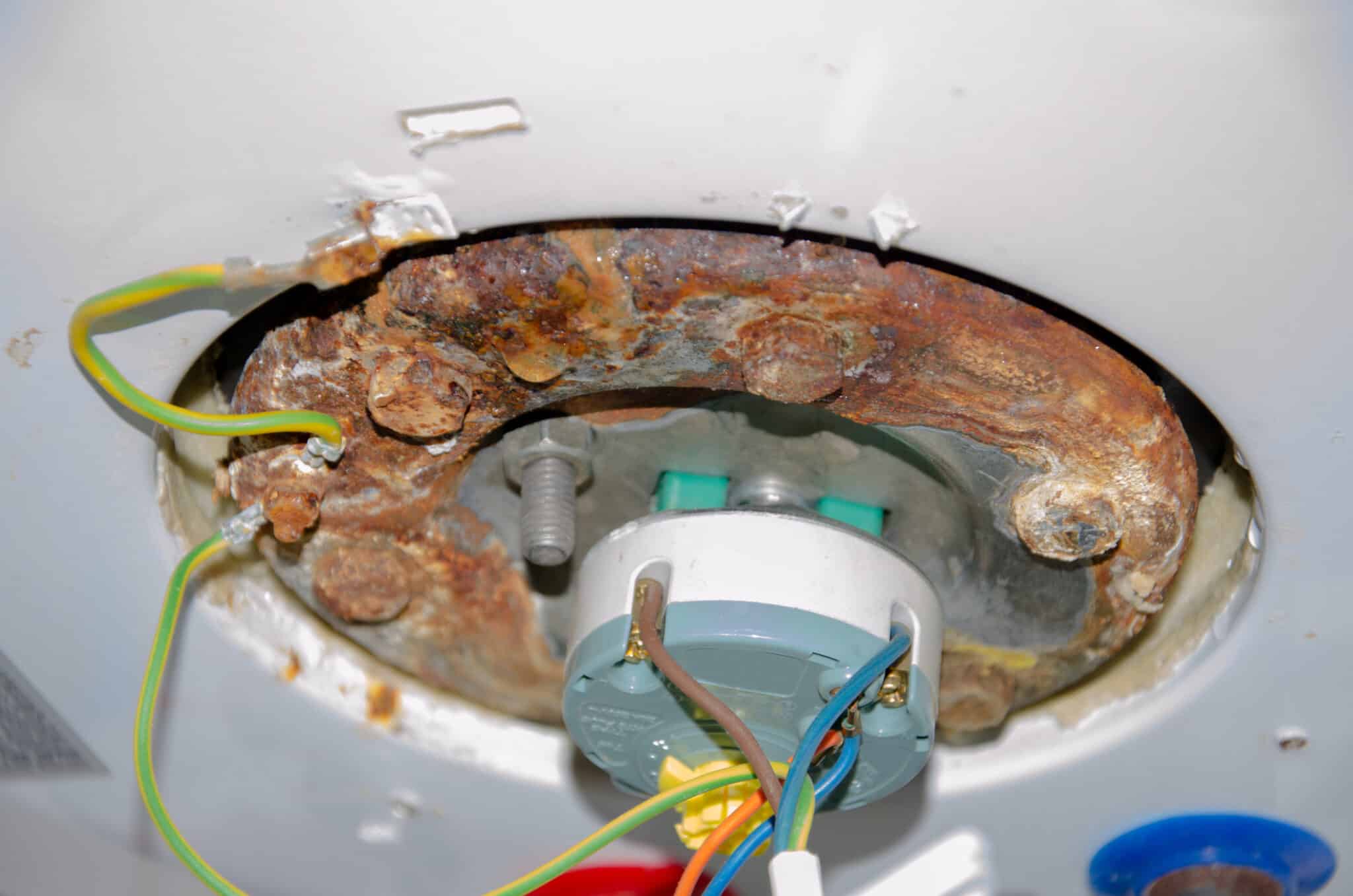
A water heater has to work harder in winter, which can mean higher energy bills, sediment buildup, and possible issues. If you notice temperature changes, weird noises, or leaks, your heater might need attention. Regular upkeep, like flushing the tank and insulating pipes, can help it last longer and run better.
More Strain on Your Water Heater in Winter
Cold weather makes your water heating system work 2-3 times harder than normal.
As the water coming in gets colder, your unit needs 30-40% more energy to heat it up (Energy.gov).
This extra work can expose weak spots, leading to slower heating, less hot water, or even breakdowns if the system isn’t in good shape.
How do you know your system is struggling?
Watch for uneven water temperature, longer waits for hot water or strange noises.
If your showers feel lukewarm or your energy bill jumps, your unit may not be keeping up.
Regular maintenance is key to avoiding problems.
Flushing the system, checking the anode rod, and adding insulation can help keep it running well.
If your unit is old or inefficient, upgrading to a newer model may be a smart move.
Don’t wait for a breakdown in the middle of winter.
If you notice warning signs, schedule an inspection with Benjamin Franklin Plumbing of Florence, SC.
Making sure your system is ready now can help you avoid cold surprises later.

High Energy Bills and Water Heater Issues
A weak water heater in winter can secretly raise your bills.
As it strains to keep up with demand, your energy costs climb.
If your bill seems too high, your unit might be to blame.
A simple fix? Set your water heater to 120°F (49°C).
This can cut energy use by 3-5% for every 10°F drop, saving you money while keeping your water warm.
Wrapping the tank and pipes also helps retain heat, so your unit works less and wastes less.
Regular upkeep is important.
Over time, sediment builds up, making your heater work harder.
Flushing the tank once a year clears out debris and helps it last longer.
If your system is over 10 years old and struggling, it may be time for an upgrade to a more efficient model.
Noticing higher bills, slow heating, or uneven water temps?
Don’t wait for a full breakdown.
Benjamin Franklin Plumbing of Florence, SC provides expert water heater services to keep your unit running well, saving you money and stress this winter.
Sediment Buildup and Performance Issues
Sediment buildup can wreck your water heating system, and winter makes it worse.
As your unit works harder to heat the colder water, minerals like calcium and magnesium settle at the bottom of the tank faster.
Over time, this sediment forms a barrier, making the system work even harder and use more energy.
Sediment buildup can cut your unit’s efficiency by up to 5% each year, driving up your energy bills.
This problem isn’t just about money.
If ignored, sediment can shorten your system’s life, leading to overheating, rust, and even system failure.
You might hear popping or rumbling sounds—clear signs your unit is struggling.
If the sediment hardens, it can clog valves and slow the flow of hot water, leaving you with lukewarm showers when you need warmth the most.
To keep your heater running well, a professional flush and maintenance check is key.
The team at Benjamin Franklin Plumbing of Florence, SC can help keep your unit in top shape so you have hot water all winter long.
Risk of Frozen Pipes Affecting Your Water Heater
Freezing weather can be bad for your plumbing, including your heater.
When it gets too cold, water in pipes can freeze and expand.
This can block pipes or even make them burst.
If not fixed, it can also damage your unit.
One big problem with frozen pipes is pressure buildup.
When water freezes, it can push pressure past 40,000 psi, which is enough to crack or burst a pipe.
If this happens near your system, it can cause leaks, lower efficiency, or even make the system fail.
To prevent this, insulate exposed pipes, especially in cold spots like basements, crawl spaces, and garages.
Letting faucets drip a little during extreme cold keeps water moving, which helps stop freezing.
Also, keeping the area around pipes and your appliance warm—using insulation or heat—can help prevent freezing.
If you think frozen pipes are causing problems for your water heater, don’t wait for a burst.
Call Benjamin Franklin Plumbing of Florence, SC right away for emergency plumbing help before things get worse.
Inconsistent Water Temperature Problems
Few things are worse than stepping into the shower expecting warm water and getting blasted with ice-cold spray instead.
If your water heater can’t keep a steady temperature, winter might be making it worse.
Colder incoming water makes your unit work harder, and if it’s already struggling, things only get worse.
One big cause of temperature changes is sediment buildup.
Over time, minerals in your water settle at the bottom of the tank, forming a layer between the heating element and the water.
This makes the unit work harder, leading to uneven heating and even overheating in some spots.
Regular professional maintenance can help remove this buildup, improving efficiency and helping your system last longer.
Another common issue is a bad thermostat or heating element.
If one of these fails, your appliance won’t work right.
A faulty thermostat can cause the water to get too hot or not warm up enough, turning every shower into a guessing game.
Keeping your system running smoothly takes maintenance.
If your Florence, SC, water heater keeps giving you unwanted surprises, Benjamin Franklin Plumbing of Florence, SC can find the problem and fix it before winter makes things worse.
Strange Noises Coming from Your Water Heater
If your water heating system sounds like a popcorn machine, something’s wrong.
Popping, rumbling, or banging noises usually mean sediment has built up at the bottom of the tank.
When water heats, steam bubbles get trapped and try to escape through the hardened sediment, causing those sounds.
If left alone, this buildup can make your unit less efficient, strain the heating element, and even shorten its life.
Another possible cause? Expanding and contracting pipes.
The metal expands when heated, and if your pipes aren’t secured well, they can knock or clank.
While not as serious as sediment buildup, it can still lead to damage over time.
When should you worry?
If the noise is loud, constant, or getting worse, it’s time for an inspection.
A popping sound often means thick sediment that needs flushing.
A high-pitched whine could mean a failing heating element, while constant rumbling points to severe scale buildup.
If you hear any of these, don’t ignore them—leaving the issue alone can lead to expensive repairs or even a broken unit.
One quick way to improve efficiency?
Insulating your tank heater and pipes.
This can help reduce heat loss and improve performance.
But if the noise won’t stop, call Benjamin Franklin Plumbing of Florence, SC for expert help.
Leaks and Signs of Wear
Cold weather puts extra stress on your water heater, making leaks and wear more likely.
The metal expands and contracts with temperature changes, which can cause small cracks that get worse over time.
A tiny leak today could lead to major water damage if ignored.
Keeping an eye on your water heating system can help prevent costly repairs.
Watch for warning signs like puddles around the base, rust-colored water, or corrosion on the tank.
Even a faint metallic smell in your hot water can mean your system is breaking down.
If your heater is 8-12 years old, leaks become more common as parts wear out, leading to less efficiency and possible system failure.
Ignoring small leaks can raise utility bills and stress your plumbing system.
In winter, weak connections or small cracks can get worse due to pressure changes and freezing temperatures.
If you see even a small leak, act fast before it turns into expensive damage.
Regular check-ups by Benjamin Franklin Plumbing of Florence, SC can catch leaks early and help you avoid costly repairs.
They’ll inspect valves, fittings, and the inside of your tank to make sure your heater runs safely.
Fixing leaks early can extend the life of your unit and protect your home from surprise water damage.
Don’t wait until you have no hot water—take action before winter makes things worse.

Water Heater Age and When to Replace It
A water heater doesn’t last forever.
If yours is over 10 years old, it may not work as well as it used to.
Most last 8-12 years, but they lose efficiency over time.
If your hot water runs out fast, looks rusty, or your tank makes strange noises, it might be wearing out.
Older units also use more energy, making them less efficient, especially in winter.
Hard water buildup can lower efficiency by up to 24% in the first year if not treated.
Over time, minerals pile up, making it harder to heat water and raising energy costs.
Flushing the system helps, but upgrading to a modern, energy-saving model could cut costs in the long run.
Newer models, especially tankless units, provide hot water on demand with much less energy use.
If you’re unsure about your system, Benjamin Franklin Plumbing of Florence, SC, can check its condition and suggest the best replacement.
Getting a new unit before it completely fails can help you avoid a freezing shock in the middle of winter.
Learn more about water conditioning systems to help your unit last longer.
Safety Concerns with Gas-Powered Water Heaters
A gas-powered water heating system works well, but it comes with risks—especially in winter when homes are sealed tight.
The biggest danger? Carbon monoxide leaks.
A bad vent or broken burner can let this deadly, odorless gas into your home without warning.
That’s why experts say you should install carbon monoxide detectors within 10 feet of your unit to catch leaks early.
Another issue is a pilot light failure.
Cold weather can mess with gas pressure, making the pilot light flicker or go out.
If this keeps happening, it could mean a bigger problem like a clogged vent or faulty thermocouple.
Ignoring it could leave you with a dangerous system—or no hot water when you need it.
Good ventilation is a must.
Without enough fresh air, your heating unit won’t burn fuel properly, which can lead to more carbon monoxide buildup.
Check vents and flue pipes often for blockages like snow, ice, or debris.
If you smell rotten eggs, see too much condensation, or notice strange burner activity, don’t wait—call Benjamin Franklin Plumbing of Florence, SC right away.
A fast inspection can stop gas leaks and keep your water heating system safe all winter.
How Hard Water Damages Your Water Heater
Hard water can quietly ruin your water heater.
It’s filled with minerals like calcium and magnesium that build up inside your tank and on heating elements.
Over time, this layer of sediment makes your system work harder, lowering efficiency and wearing down parts.
If not dealt with, it can clog pipes, slow water flow, and even shorten your heater’s life.
A big sign of hard water trouble is uneven heating.
If your shower turns cold too fast, your tank might be struggling with mineral buildup.
Popping or rumbling sounds from the unit are another clue.
These noises happen when trapped water turns to steam and bursts through the sediment.
This extra stress can lead to expensive repairs or even system failure.
The best way to fight hard water damage is through regular water heater maintenance.
Flushing and descaling help boost energy efficiency and cut down the risk of sudden breakdowns by keeping heating elements clean.
Installing a water conditioning system can also stop mineral buildup before it starts.
If your unit is acting up, don’t wait.
Benjamin Franklin Plumbing of Florence, SC can help keep your system in top shape.
Learn more about water conditioning systems here.
Pro Maintenance vs. DIY Care
Keeping your water heater in good shape helps it run smoothly, but not every fix should be a DIY job.
Some tasks, like adjusting the thermostat, checking for leaks, and flushing the tank once a year, are simple enough for homeowners.
But bigger issues need a pro.
A licensed plumber checks key parts like the anode rod, heating elements, and gas or electrical connections—things that are easy to miss and risky to handle without training.
Getting a professional tune-up helps your system last longer and keeps it safe, especially for gas units that can leak carbon monoxide.
Skipping regular maintenance can lead to sediment buildup, which makes your unit less efficient, causes odd noises, and creates uneven water temps.
In fact, pro maintenance can boost efficiency by up to 10% and cut the risk of breakdowns by 95%.
That’s not a risk worth taking.
Cold weather puts extra strain on your water heater, so preventative care is even more important.
A plumber can catch small problems before they turn into big ones, saving you from expensive repairs.
If you notice hot water issues, rising energy bills, or strange noises, it’s time to call a pro.
For Florence, SC homeowners, Benjamin Franklin Plumbing of Florence, SC offers expert water heater maintenance and repair to keep your system working its best.
Don’t wait for a full breakdown—schedule a check-up now and enjoy reliable hot water all winter.
FAQs
How often should I flush my water heater?
Flush your water heater once a year to clear out sediment and keep it running well. If you have hard water, flush it twice a year to avoid problems.
Why does my unit make banging or popping noises?
These sounds usually come from sediment buildup at the bottom of the tank. When water heats, air bubbles escape through the sediment, making popping noises. Flushing the tank can fix this, but if the noise doesn’t stop, get a professional to check it.
What temperature should my system be set to during winter?
Set it to 120°F (49°C) for safety and efficiency. This helps prevent burns and saves energy—each 10°F lower cuts energy use by up to 5%.
How do I know if my water heater needs to be replaced?
If your water heater is 8-12 years old, leaks often give rusty water, or can’t keep a steady temperature, it may need replacing. A professional in Florence, SC can check it and advise you on the best option.
Can frozen pipes damage my system?
*Yes, frozen pipes can build up high pressure—sometimes over 40,000 psi—causing them to burst and possibly harm your water heater. To avoid this, insulate exposed pipes and keep your home warm in freezing weather.*
Mon–Sat | 8:00 am–5:00pm 24/7 Emergency Service






